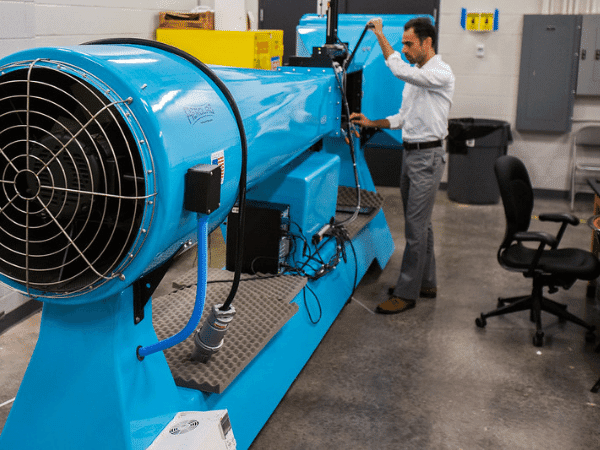Thinking about becoming a mechanical engineer? There are great opportunities in the career field. In this blog we explore what mechanical engineering is, how you can become a mechanical engineer, what a day in the life of a mechanical engineer is like, and how much you can expect to make in the industry.
What is mechanical engineering?
Mechanical Engineering is one of the broadest and diverse engineering disciplines. Mechanical engineers play a vital role in a wide variety of industries, including aerospace, automobile, biotechnology, microelectromechanical systems, oil and gas, renewal energy, nuclear power, robotics, manufacturing, automation, and space exploration. According to the American Society of Mechanical Engineers, its 36 listed divisions range across design, systems, materials, energy, manufacturing, and service sectors.
Technically, mechanical engineers apply the principles of natural science for the analysis, modeling, design, and synthesis of physical systems to address the challenge faced by humankind. Virtually every product or service in our daily life is touched by a mechanical engineer in one way or the other.
This versatility of the mechanical engineering discipline allows the students to explore career options across and beyond the areas mentioned above. Mechanical engineering education imparts skills and knowledge to facilitate critical thinking and a creative mindset to solve real-world problems. The analytical skills and tools help to formulate a comprehensive problem encompassing available resources and constraints. These exceptional skills allow students to launch a career and create technologies in many other fields such as healthcare, management, consulting, sustainability, and entrepreneurship and help them excel in their respective careers.
What do mechanical engineers do?
Mechanical Engineering is one of the broadest engineering science, which entails understanding and implementing laws of nature to design, build, understand and control a wide variety of machines, mechanisms, and systems. This challenging task needs creative thinking, broad knowledge, and versatility. Mechanical engineers work in a broad range of areas such as:
- Energy Generation, Harvesting, Conversion, and Storage
- Product Design and Development
- Biomedical Devices
- Automobiles, Space Shuttles, and Airplanes
- Robotics, Automation, Mechatronics, and Control
- Material Design, Testing, and Analysis
- Modeling and Analysis of Mechanical and Biomechanical Systems
- Heating, Ventilation and Refrigeration Systems
- Specialized Applications such Defense, Space, and Atomic Energy
How to become a mechanical engineer?
To become a mechanical engineer, one needs to earn a bachelor’s degree in mechanical engineering or mechanical engineering technology, ideally from an ABET accredited program. However, to provide public services in any state, a professional engineer (P.E.) license must be obtained in that state.
Why study mechanical engineering?
According to the Bureau of Labor Statistics' Occupational Outlook Handbook, mechanical engineering is one of the most versatile engineering science with a projected growth of 4% in employment over the next 20 years from 2019 to 2029. Mechanical engineers usually get paid around $100,000, which is much higher than the other occupations. This profession requires creativity and ingenuity to solve the practical problems in the design, leading to high job satisfaction and a sense of accomplishment.
The UTPB Mechanical Engineering program educates and trains engineers to envision and formulate solutions to everyday problems. Mechanical Engineering students will learn to design a machine, a system, or a process. Students will then analyze their designs using the principles of physics to ensure the product functions safely, efficiently, and reliably.
What does a mechanical engineer do on a daily basis?
Mechanical engineers primarily work in offices. A typical day in mechanical engineer includes work in three major areas of technical work (usually involving a team of experts); interaction with the stakeholders, and documentation. The technical work often involves designing, defining specifications, modeling, analysis, testing, and evaluation of a product or process. The second task is to interact with the stakeholders to fully understand the goals and requirements to avoid issues in executing or launching a project or product. Last but not least is the documentation of the work for clear understanding and execution of the work.
How much does a mechanical engineer make?
The national average annual wage of a mechanical engineer is $95,560, according to the BLS, roughly $40,000 more than the average annual wage for all occupations, which is $56,310.
Why should you choose the UT Permian Basin Mechanical Engineering Program?
UT Permian Basin College of Engineering is ranked the #1 best value engineering schools in Texas, has awarded more than $150,000 in scholarships, and continually beats national and state averages pass rates for the Fundamentals of Engineering Exam.
The College of Engineering building officially opened its doors in fall 2019. The three-story building covers 105,801 square feet and cost $55 million. Inside you'll find state-of-the-art laboratories, classrooms that lend to hands-on learning, a lecture hall, study spaces, and so much more.




